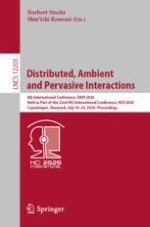2020 | OriginalPaper | Chapter
Ambient UX Research: User Experience Investigation Through Multimodal Quadrangulation
Authors : Marco Mandolfo, Milica Pavlovic, Margherita Pillan, Lucio Lamberti
Published in: Distributed, Ambient and Pervasive Interactions
Publisher: Springer International Publishing
Activate our intelligent search to find suitable subject content or patents.
Select sections of text to find matching patents with Artificial Intelligence. powered by
Select sections of text to find additional relevant content using AI-assisted search. powered by
